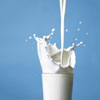Melbourne scientists develop cows’ milk that protects against HIV
Posted: 26 October 2012 | | No comments yet
Melbourne researchers have developed cows’ milk that can protect human cells from human immunodeficiency virus (HIV)…


Melbourne researchers have developed cows’ milk that can protect human cells from human immunodeficiency virus (HIV). The next step will be to develop it into a cream which can be applied to protect against contracting HIV from sexual partners.
Melbourne University’s Dr Marit Kramski and her colleagues worked with Australian biotechnology company Immuron Ltd to develop the milk.
The scientists vaccinated pregnant cows with an HIV protein and studied the first milk that cows produced after giving birth. The first milk, called the colostrum, is naturally packed with antibodies to protect the newborn calf from infections, with the vaccinated cows producing HIV antibodies in their milk.
“We were able to harvest antibodies specific to the HIV surface protein from the milk,” said Dr Kramski
“We have tested these antibodies and found in our laboratory experiments that they bind to HIV and that this inhibits the virus from infecting and entering human cells,” she said.
While cows cannot contract HIV, their immune systems develop antibodies against the foreign protein.
“We hope that our anti-HIV milk antibodies will provide a user-friendly, safe and effective tool for the prevention of sexually acquired HIV infection,” Dr Kramski said.
About 30 million people are living with HIV globally and there is presently no effective vaccine for humans.
Melbourne is leading the way in research into the treatment of HIV, with researchers from the Alfred Hospital, Monash University and Burnet Institute having earlier this year been part of a global effort to find a cure for HIV.
About 20 HIV-positive patients in the state of Victoria agreed to test the effectiveness of a new drug to ‘wake up’ the virus in cells where it lies dormant, away from the reach of current anti-viral drugs.
Sally Capp, Agent-General for Victoria in the UK said, “Melbourne has a fantastic track-record for medical research and development of drugs to treat diseases that affect millions of people globally. This year has seen our extraordinary research institutes take huge steps in developing a cure for HIV and this latest cow’s milk discovery is further testament to the fact that Melbourne has the skills base, R&D facilities and intellectual capital to really make a difference to people around the world.”
Melbourne will also host the International AIDS Conference in 2014, which was secured with support from the Victorian Government and is set to be the largest medical conference ever held in Australia, expecting to attract 14,000 participants.
The cows’ milk research was supported by the Australian Centre for HIV and Hepatitis Virology Research and the National Health and Medical Research Council (NHMRC). Dr Kramski and her colleagues are now developing plans for animal and human studies.




